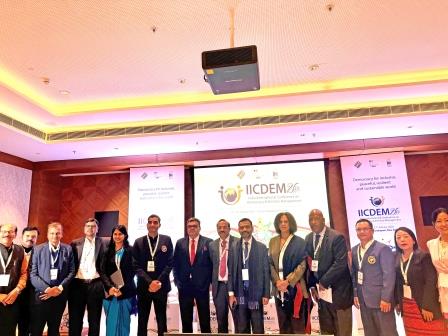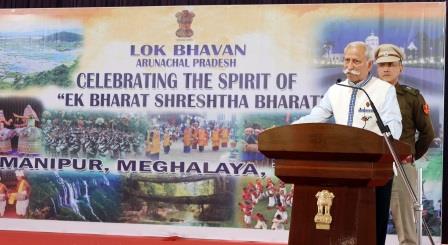-
 Team Arunachal Pradesh participates in IICDEM 2026; leads thematic…
Team Arunachal Pradesh participates in IICDEM 2026; leads thematic…
-
24hr bandh hits normal life in Lower Subansiri
-
 Lok Bhavan celebrates State Foundation Day
Lok Bhavan celebrates State Foundation Day
-
 Arunachal Yuva Samanvay 2026 underway in Namsai
Arunachal Yuva Samanvay 2026 underway in Namsai
-
DA conducts Keyi Panyor Suvidha outreach campaign
-
 Governor confers BSG Rajya Puraskar
Governor confers BSG Rajya Puraskar
-
Pongte stresses use of technology in law-making
-
 Vintage Jeep & Bike Rally commemorates end of World War-II
Vintage Jeep & Bike Rally commemorates end of World War-II
-
ARC partners with AITF, apex CBOs to lead strategic dialogue
-
Dibang Valley administration reviews progress of ongoing schemes
The coveted geographical indications (GI) recognition is a proof of a products unique geographical origins, thereby getting legal protection to prevent their unauthorized use. For a state as varied as Arunachal, this point cannot be reiterated enough.
Arunachal Wakro Orange is an example why we need to push for GI tag for more of our unique products. The delicious Arunachal Wakro Orange has been for long exported to Bangladesh and from there to other countries under various names thereby depriving the state of its intellectual property right. But after it received the GI tag in 2015, Arunachal Wakro Orange has received its due recognition.
Arunachal’s rich handlooms needs protection too. Indigenous weaves are hundred percent handmade in loin looms. They are a labour of love. Imagine if some textile company based outside were to mass produce these cheaply and flood the market.
Arunachal Pradesh is yet to pay due attention to the protection of its intellectual properties. There is a lot of traditional knowledge -- tangible and intangible, which exists in our tribal society, for instance traditional designs incorporated in ‘Gales’ or ‘Galuk’, folk songs of different tribes, traditional games, folk lores, etc. This traditional knowledge is the wealth of our communities and must remain so. Arunachal government must initiate and encourage “traditional knowledge and arts” to be patented.
GI tag essentially works like a trademark or intellectual property right in law, wherein a product belongs exclusively to a particular territory, and “a given quality, reputation, or other characteristic of the good is attributable to its geographic origin”. This is as per the World Trade Organisation agreement on Trade-Related Aspects of Intellectual Property Rights (TRIPS).
Certain communities depend entirely on the market success of their indigenous products, and a GI tag provides recognition and protection of economic livelihoods. Products also become synonymous with cultural and geographical identity over time, embodying a history of craftsmanship, community, and civilisation.
GI tags also boost sales and exports, as the geographical limitation on production and official recognition of historical and cultural significance increase demand and create a legacy.

Kenter Joya Riba
(Managing Editor)She is a graduate in Science with post graduation in Sociology from University of Pune. She has been in the media industry for nearly a decade. Before turning to print business, she has been associated with radio and television.
Email: kenterjoyaz@easternsentinel.in / editoreasternsentinel@gmail.com
Phone: 0360-2212313

